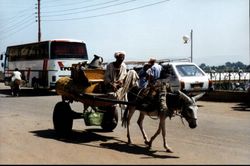Drugs and death in Afghanistan: What happened to Spc. Juan Torres?
Torres was close to the end of his eight years of reserve and active service. He had served in Kosovo and Hungary, and received four medals, including the Army Achievement Medal for his "motivation, energy and technical expertise." He was in good health. He didn't smoke or do drugs, and had strong relationships with his family and numerous friends.
On July 12, 2004 - just weeks before he was due to come home to Houston after his yearlong duty in Afghanistan - Torres was found dead in a shower/latrine at Bagram Air Base. The cause of death was a self inflicted gunshot wound to the head....or so the Army says.
His family and fiancee say there is no way he would have taken his own life. And several soldiers who served with John at Bagram told the family that the Army is either not telling the whole story or is not telling the truth at all. The family wants answers. So far, the Army hasn't provided them.
Spc. Torres' father, also named Juan, is a hotel worker who came from Argentina 26 years ago. He lives in a modest home near Chicago. He goes to antiwar demonstrations carrying a sign with a photo of his handsome, dark-eyed son, hoping his case will get some attention.
Torres had just returned from the demonstration at the president's inauguration when the World interviewed him at his home, Jan. 23. With a hoarse voice, exhausted by the drive back from D.C. and the turmoil he has lived with since his son's death, Torres reviewed the many questions troubling him and his family.
He had spoken to his son by telephone just a day or two before John's death. "'Daddy, I'm so glad - I will be out of here in a couple of weeks,'" Torres said, mimicking his son's upbeat tone. "He told me, 'Daddy, there are so many drugs here. I tell the people, 'Don't use the drugs.'"
Torres said they spoke about John's upcoming marriage to Elizabeth, planned for August in Las Vegas, and the family's plan to visit Argentina.
John had also called his mother and his fiancee the day before his death, excited about his impending return home.
The next thing Torres knew, he got a call from his daughter in Houston, July 13. "She told me, 'Daddy, daddy, something happened. John is dead.' The Army didn't say what happened. I didn't know if it was the Taliban or what. I went to Houston for the funeral."
....'Don't believe what the Army's telling you'
Veronica Santiago [John's sister] told the World that, at the funeral, July 20 in Houston, the captain, who was one of her brother's superiors at Bagram, "hugged me and said, 'I'm really sorry. Don't believe what the Army's telling you.' "
A month later Santiago received a call from the captain. She told Santiago she had important Criminal Investigation Division (CID) documents, and that "it was going to be 'a big deal.' " Santiago said, "She kept saying that" over and over. The captain told John's mother she was going to write a long letter about the case, but to date the family has not heard anything more from her.
Another soldier told the family that drugs were rampant at Bagram, and that she herself had used drugs there. According to Santiago, the soldier said she had seen drug sales taking place in a room at the base, with large amounts of cash on a table. The soldier said she believed Spc. Torres must have seen something he didn't approve of, and paid with his life. Santiago said her brother was a person who spoke out if he saw something he didn't approve of. "Knowing him, he would have told somebody, he would have made it known."
Later, Santiago said, the soldier told the family she did not want to become involved in their efforts to dig into the death because she feared getting into trouble. Subsequently, a reporter seeking to call her found her phone had been disconnected.
The possibility of a drug problem at Bagram was discussed by investigative reporter Seymour Hersh in an April 12, 2004, article in The New Yorker. Hersh wrote, "Since the fall of 2002, a number of active-duty and retired military and CIA officials have told me about increasing reports of heroin use by American military personnel in Afghanistan, many of whom have been there for months, with few distractions." A "former high-level intelligence officer told Hersh that the problem was centered among the logistical and supply units stationed at Bagram. "The Pentagon's senior leadership has a 'head-in-the-sand attitude,' [the officer] said. 'There's no desire to expose it and get enforcement involved." Link to full pww article










